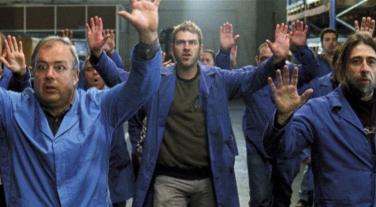
A Fábrica de nada, Pedro Pinho, Portugal, 2017, 177’ OV PR Sub. ES
Was this one of the “films of the year” in 2017? Yes it was. Premiered during the Directors' Fortnight at the Cannes Film Festival 2017, it won the FIPRESCI critics' prize. Following that award, its reception at festivals around the world was spectacular. It was awarded the Golden Giraldillo as best film at the European Film Festival in Seville, with the jury highlighting its boldness in combining documentary, fiction and musical in the same film about the complex economic situation that defines our times. And the jury of L'Alternativa, the Barcelona Independent Film Festival, also awarded the film the Grand Prize of the festival as best film for its ability to explore ways of overcoming the savage capitalism that dominates Europe.
We are therefore talking about an essential and highly topical film. Employees of a Portuguese lift factory discover that their bosses have been secretly removing machinery and this alerts them to the possibility that they might be about to lose their jobs. Thus begins a struggle of wills, with most of the workers refusing to collaborate in the subsequent negotiations. It is also when they decide to occupy the factory.
The tradition of contemporary Portuguese cinema has accustomed us to having to be courageous as spectators. And this film follows that path set out by directors such as Costa, Gomes, Lamas and Villaverde, because at no time is it afraid to break the boundaries and limits of the documentary, of fiction or even of the musical.
It is curious that during last years in the international festival scene were three titles in Portuguese that dared to stare the crisis in the face, that have responded to this situation through film-making, without hollow proclamations or condescending pamphlets. Films that speak from the cinema about what is happening to us today: Arábia by João Dumans and Affonso Uchoa, Colo by Teresa Villaverde and A fábrica de nada by Pedro Pinho There is a common thread through these three films that is connected to the daily experience of the crisis in Europe.
If you want to know why there are films that define an era and why there is film-making that is still looking for ways to talk about the world that surrounds us, you should come to see this film. We could call it “cinephile responsibility”. Each one of us can decide if we want to take responsibility.
“In Portugal and Europe, recent years have forced a brutal redefinition of the way we look at the world. A lack of perspective and valid discourses on the present is what has usually made us feel ineffective.
The Nothing Factory emerges from there. The closure of a factory making lifts (one of the many that closes every month on the outskirts of Lisbon) functions as a microcosm and a stopping off point where we can dramatically explore the textures and consequences of the sense of helplessness that most people feel in these moments. With the shadow of bankruptcy over them, the characters try to keep their heads above water and look for ways to redirect their lives. Driven by a sense of urgency and a kind of vital instinct that prevails, as they witness the collapse of their jobs and the institutions in which they believed, they are forced to embark, with fear and reticence, on an entirely new experience, a collective adventure.”
Pedro Pinho
A Fábrica de nada, Pedro Pinho, Portugal, 2017, 177’ OV PR Sub. ES
